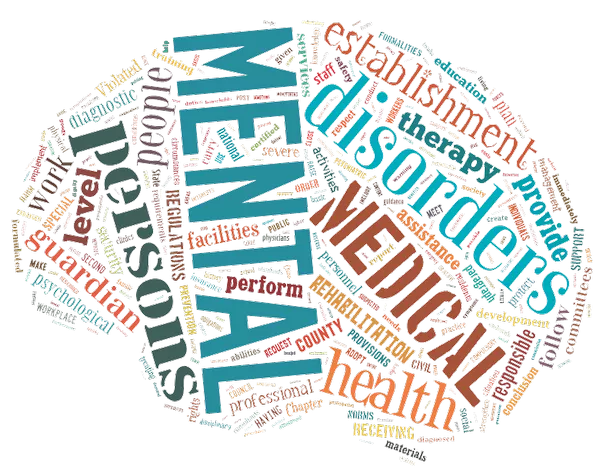Mental illnesses affect millions of people worldwide, impacting their daily lives, relationships, and overall well-being. The challenges posed by mental health disorders vary widely, making it difficult to pinpoint a single “hardest” mental illness to live with. However, certain conditions tend to be particularly debilitating and come with unique sets of difficulties. In this comprehensive article, we will explore some of the most challenging mental illnesses to live with, their characteristics, and the importance of understanding and supporting individuals facing these conditions.
Understanding the Complexity of Mental Illness
Before delving into specific mental illnesses, it’s crucial to recognize that mental health conditions exist on a broad spectrum. They can range from relatively mild and manageable to severe and profoundly disruptive. The impact of a mental illness depends on various factors, including its severity, duration, individual coping mechanisms, access to treatment, and external support systems.
Moreover, each person’s experience with a mental health disorder is highly personal and can differ significantly from someone else’s. What may be incredibly challenging for one individual may not be as difficult for another, even when facing the same diagnosis. Thus, labeling a single mental illness as the “hardest” to live with oversimplifies the complexity of mental health.
Challenging Mental Health Disorders
While it is essential to emphasize the uniqueness of each person’s experience, several mental health conditions are generally considered to be particularly challenging due to the severity of their symptoms, the impact on daily functioning, and the stigma associated with them. Here are some of these conditions:
1. Schizophrenia:
Schizophrenia is a severe and chronic mental illness characterized by a range of symptoms, including hallucinations, delusions, disorganized thinking, and impaired emotional expression. People with schizophrenia often struggle with maintaining relationships, employment, and daily self-care. The condition can lead to profound social isolation and a higher risk of homelessness.
2. Bipolar Disorder:
Bipolar disorder involves extreme mood swings, including manic episodes of elevated energy and depressive episodes marked by sadness and hopelessness. Living with bipolar disorder can be challenging due to the unpredictability of mood shifts and their impact on daily life. Maintaining stable relationships and employment can be particularly difficult.
3. Borderline Personality Disorder (BPD):
Borderline personality disorder is characterized by intense mood swings, unstable self-image, impulsivity, and difficulty maintaining stable relationships. Individuals with BPD often experience extreme fear of abandonment and may engage in self-destructive behaviors. The emotional intensity and interpersonal difficulties associated with BPD can make it challenging to live a stable life.
4. Post-Traumatic Stress Disorder (PTSD):
PTSD can develop after experiencing a traumatic event and involves symptoms like flashbacks, nightmares, severe anxiety, and emotional numbing. Individuals with PTSD may find it challenging to function in situations that trigger their traumatic memories, making daily life and relationships difficult to navigate.
5. Eating Disorders:
Eating disorders such as anorexia nervosa and bulimia nervosa can be incredibly challenging to live with due to their severe physical and psychological effects. These conditions often lead to dangerous weight loss, malnutrition, and obsessive thoughts about food and body image.
6. Obsessive-Compulsive Disorder (OCD):
OCD involves persistent, distressing obsessions (intrusive thoughts) and compulsions (repetitive behaviors) aimed at reducing anxiety. Living with OCD can be difficult as individuals may spend hours each day performing rituals to alleviate their distress. OCD can significantly interfere with daily life and relationships.
7. Major Depressive Disorder (MDD):
Major depression is characterized by persistent feelings of sadness, hopelessness, and a lack of interest in activities. It can be challenging to live with MDD due to its debilitating impact on motivation, energy levels, and overall quality of life. Suicidal thoughts are a severe risk associated with this condition.
The Importance of Understanding and Support
While these mental health disorders can be particularly challenging, it is essential to emphasize that recovery and management are possible with appropriate treatment, support, and understanding. Seeking help from mental health professionals, such as therapists, psychiatrists, or support groups, can make a significant difference in one’s ability to cope with and manage these conditions.
It is equally vital for society to combat the stigma surrounding mental illness. Stigmatizing attitudes and misconceptions about mental health can further isolate individuals and discourage them from seeking help. Education, empathy, and destigmatization efforts are crucial in supporting those living with mental health conditions.
Furthermore, family, friends, and communities play a pivotal role in providing a support network for individuals facing mental health challenges. Offering compassion, listening without judgment, and encouraging professional help-seeking can contribute to a person’s recovery and well-being.
Conclusion
In summary, there is no one-size-fits-all answer to the question of which mental illness is the hardest to live with. Mental health disorders vary widely in their nature and impact, and each person’s experience is unique. However, it is essential to acknowledge the significant challenges faced by individuals living with severe mental illnesses and to promote understanding, empathy, and access to mental health resources to help them lead fulfilling lives.


